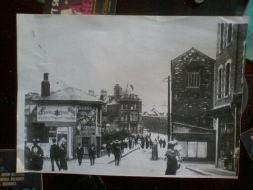
ᚓ E Edad Unknown érgnaid fid"discerning tree" commaín carat"exchange of friends" bráthair bethi (?)
"brother of birch" (?)
ᚔ I Idad 'Yew-
"oldest tree" caínem sen "fairest of the ancients" lúth lobair (?)"energy of an infirm person" (?)
ᚕ EA Ébad Unknown snámchaín feda "fair-
"fairest fish"
Eldad and Medad are said to have predicted a war with Gog and Magog



Eldad hill
Hawker was born in Exeter in 1753 to Jacob Hawker, a surgeon in Exeter. He was married aged 19 to Anna Reins, and they had eight children altogether.
Hawker studied medicine in Plymouth under Samuel White of Bretonside, and joined the Royal Marines as assistant surgeon. In 1778 he entered Magdalen College, Oxford.
Ministry in Plymouth
Hawker was a few months at Looe as a curate and then appointed as assistant curate to Charles Church (still in 1778) under John Bedford. He was ordained in 1779. He succeeded Bedford on his death in 1784 and held the living until his own death in 1827.
He was a man of great frame, burly, strong and with blue eyes that sparkled and a fresh complexion. His humour was deep and razor sharp and his wit popular although he had a solemn exterior and in conversation would resort to silence while contemplating a difficult retort. He played the violin well and was an excellent scholar. Almost as soon as he arrived as curate he started writing and poured out over the year a long list of books, volumes of sermons, a theological treatise, a popular commentary, a guide to communion and also books of lessons in reading and writing for the schools. For a work of his on the divinity of Christ (combating the rise of Unitarianism) the University of Edinburgh conferred upon him a degree of Doctor of Divinity in 1792. He also produced the “Poor Man’s Morning and Evening Portions” that were used long after his death.
Sermons[edit]
It was in the pulpit that “the Doctor” was best known and loved. Thousands flocked to hear the “Star of the West” preach when he was in London. An Evangelical he preached the Bible and proclaimed the love of God. He was said to have great Biblical knowledge and could preach a good sermon on any passage at a moments notice. If his grandson Robert Steven can be trusted his preaching won the admiration of King George III who used to hand him a text just before he went to the pulpit. His preaching was with power, passion, animation, scholarship and yet with a human touch. He was an extempore preacher who began, despite clergy or the Bishop’s protest, with an extempore prayer. He held vast audiences for 70 or 80 minutes (the north and south galleries built to add capacity during his time). On a spring or autumn evening he would be lost in the evening shadow before finishing, his voice and the majesty of the theme holding people to the end.
Pastoral work[edit]
He was not a man simply of books and sermons. “The Doctor” took his responsibilities seriously. He regularly visited his parishioners and was diligent in his responsibilities to the poor. When food was scarce after the long wars with France in 1817 he started a scheme of selling sixpenny loaves for three pence supported by donations from his congregation and distributed 1,000 loaves. He was a little eccentric and one day marched onto a baker’s shop and after buying an eight pound loaf he placed it under his arm. The baker offered to send it to his home but Hawker said “No I am going to take it to a starving family nearby, a man and his eight children. But if you give me another loaf I will carry that as well”. The baker complied without a word.
Charles Church, May 2002
He started the Misericordia Fund in 1794 to provide for the relief of destitute strangers. A refuge for prostitutes followed after. In 1809 as troops returned from Spain several ships put in at Plymouth and he helped bring ashore hundreds of men suffering diverse fevers. They were housed in a nearby barn and hundreds of them died in the next week. Over 300 townspeople also fell victim to the fevers. Hawker and his wife visited the sick each week and scorned their personal risk. In 1813 Dr Hawker began the Corpus Christi Society to search out and seek the distressed members of Christ’s body. It was not limited by parish boundaries or denomination but the needs of Christians were met where they were found.